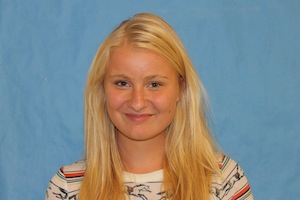In case the college athletic recruitment process (make that the college process in general) isn’t complicated enough, here’s one more caveat.
If student athletes are pursuing athletic recruitment, they need to think twice when scheduling their classes. To be eligible for a Division I athletic scholarship, there are certain requirements for the core academic classes that the athlete must take in their high school years. For the most part, the requirements are the same or less than the regular graduating requirements for Staples, but there is a catch: not every class counts.
“I actually did try to sign up for Film Analysis, and for a while it was on my schedule for my senior year, but the guidance office informed me before the end of last year that the NCAA [National Collegiate Athletic Association] doesn’t approve it, so I switched into a different class,” swimmer Verity Abel ’14 said. Abel was recruited by Duke University and recently signed a letter of intent to attend that school.
Courses must be accredited by the NCAA for them to count towards athletes’ eligibility. Every year, Staples sends the NCAA a description of all its courses, similar to the course catalog given to students to pick classes from. The NCAA then informs the school which classes it will and will not give credit for. Student athletes can, of course, still take non-accredited classes, but they must do so in addition to classes that will fulfill the NCAA eligibility standards.
“It’s kind of a tricky situation,” guidance counselor P.J Washenko said. “We know our curriculum is rigorous. Why they’d think otherwise, I don’t know.”
Washenko says that as long as students inform their counselors that recruitment is a possibility, preferably when students start planning their junior year, issues with eligibility hardly ever arise.
Jonathan Blansfield ’14, who was recruited to Northwestern University for swimming, echoed Washenko’s sentiment. “My guidance counselors were definitely helpful once the process began,” Blansfield said. “The coaches I was getting recruited by were very clear in what classes I needed to have on my transcript when applying, such as honors and AP courses. My counselor and I went over my classes and made sure that I received credit by the NCAA so I wouldn’t run into any problems later in the recruiting process.”
In most cases, students have very few schedule-based issues with gaining eligibility. However, some of the most popular classes at Staples, like Film Analysis, Journalism, and Horticulture, remain discredited, seemingly because the NCAA regards them as less academically rigorous, and recruit-hopefuls are discouraged from taking them.
English teacher Barbara Robbins, who teaches Film Analysis, feels that while the NCAA is entitled to make its own decisions, there is a misconception about the rigor of her class.
“My feeling is that film requires the same literacy skills that are embedded in any English class.” Robbins said. “It’s a little old-fashioned, especially when talking about 21st century skills, to say that texts are the only thing worth exploring.”
Robbins feels that analyzing film, which students may have had very few opportunities to do throughout their education, forces students to think in a different way than they are used to, which improves both their critical thinking and writing skills.
Washenko feels that since these classes are appropriately challenging for some students, this stipulation is somewhat unfair, but there is little that can be done about it.
“It’s something that’s out of our hands,” he said. “I do wish they’d take student input a little more.”













































